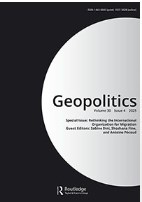Bilateralism and the Politics of European Judicial Desire
Transnational economic integration has long been one of the preferred ways in which powerful global players signal their political and economic strength to potential trade partners. A main goal of the European Union in becoming an influential political and economic elite is expanding its transnational relations. The Mediterranean region receives special attention in this process. A series of free trade agreements have been signed between the EU and Mediterranean countries. The political and socio-economic instability of the region required creativity both in the design of these bilateral agreements and in their judicial interpretation, which involved defining the recognized economic borders of signatory states. This activity raises subtle questions regarding the contractual obligations of the parties, the credibility of the agreements, and the likelihood of successful future agreements. The problems associated with this interpretive activity recently acquired a constitutional foothold via the European Court of Justice in Brita GmbH v. Hauptzollamt Hamburg-Hafen, a case that involved defining the legitimate and recognized economic borders of the State of Israel. In the Brita case, the ECJ held that Israeli products originating in Israeli settlements in the Occupied Palestinian West Bank do not fall within the territorial scope of the 1995 European Community-Israel Association Agreement.
Therefore, the products could not be imported into the Union dutyfree, unlike Israeli products manufactured within Israel’s 1967 borders. In this Article, we take trade relations between the EU and Israel as an exemplar of transnational bilateralism in volatile political climates and examine the limits and consequences of a supranational court interpreting the economic borders of a signatory state to a bilateral agreement. The argument we develop moves between procedural justice and legitimate judicial behavior and between values embedded in transnational contractual settings and their actual applications. It offers an innovative inquiry into the difficulties inherent in bilateralism and in a regional court’s attempt to substantiate its constitutional role by unilaterally determining the proper balance between judicial autonomy and regional politics via declaring certain territories of a state illegitimate.



